Andy Luotto: American-Italian chef is Superman in kitchen

He did stand-up comedy while stoned in a Moroccan nightclub then performed in Libya after getting death threats for insulting Islam. He did scuba diving documentaries in the Galapagos Islands. He’s written four books. He has released four records as a singer. He was the executive chef at a five-star restaurant and owned four restaurants. He appeared in 17 films, ranging from playing an anti-Mafia judge to Superman’s ugly brother.
Yet when Andy Luotto was a kid in Brooklyn, his biggest skill was setting fire to phone booths.
Luotto has been a public figure in Italy longer than most of its politicians. At 72, he is now concentrating on what sold him on Italy as a 14-year-old – besides avoiding reform school.
Cooking.
The star of TV cooking shows and food author is a consultant at Osteria Il Matto, an Italian restaurant down the hill from me in the neighborhood of Trastevere. Twice a week he does a cooking demonstration in the dining room. Friday he performed for about 35 guests from Expats Living in Rome, the Meetup group I’ve belonged to since arriving here nine years ago.

Osteria Il Matto
He made pittule, these delicious deep-fried lumps of flour with seasonings that are as addicting as crack cocaine and about as healthy. They came before the restaurant gave us classic Roman pasta carbonara and then guanciotto, fat chunks of pig’s cheek soaked in red wine.
Opened three years ago, Il Matto (“The Fool” in Italian) is named for the tarot card with the number zero. The zero is the link between the past and future. Il Matto mirrors that with classic Roman dishes such as carbonara and new twists such as replacing tomatoes in pasta amatriciana with pumpkin cream.
Luotto and I had met before. I interviewed him six years ago at Fritto Misto, a fried food festival held every year in Ascoli Piceno, Marche. We talked about how fried food in Italy isn’t all that unhealthy (“It’s the type of oil we use,” he said. “We use more olive and peanut oil.”) and the evils of American diets.

Andy Luotto background
But we didn’t get into his background. Born in Brooklyn to a scientist with five degrees and a Sicilian-Piedmontese father who left the family early, Luotto did go to Rome as a 14-year-old. He stayed with his estranged father, who was producing dubbed movies. In Italy he learned the language and learned he loved cooking. What reform school lost, the Italian cooking industry gained.
When I saw him Friday, he still had the little ponytail and salt-and-pepper beard. He still looked like a Renaissance artist dropping in from a time machine. But he’s an artist in the kitchen. He’s an artist on the screen.
“I still feel I’m a little Forrest Gumpish,” he said.
Here’s a 30-minute interview I did with him before dinner. Parts were cut for brevity and subjects were flip flopped by director’s mindless discretion:

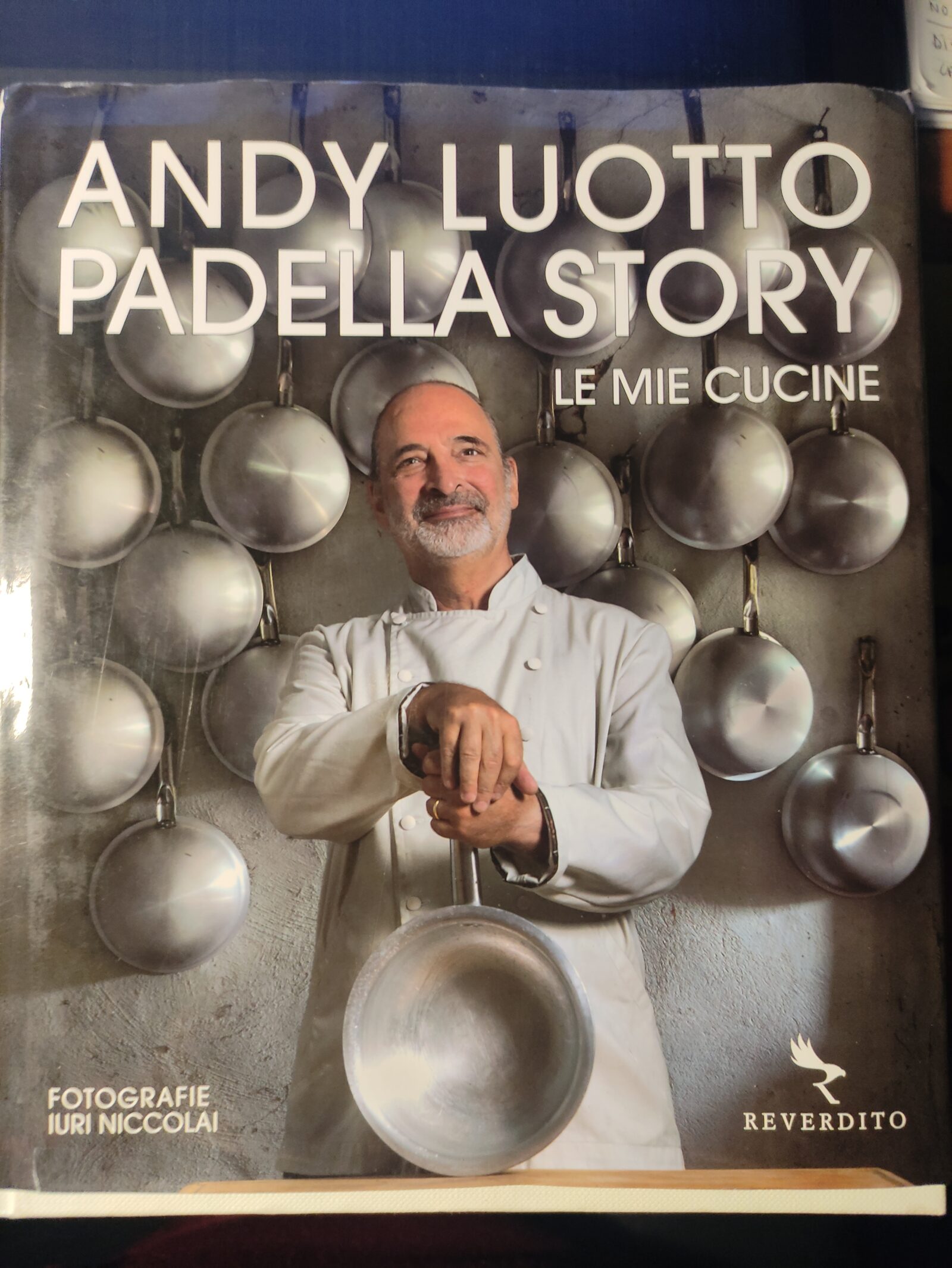
Luotto on cooking
Q: TALK ABOUT COOKING A LITTLE BIT. AMERICANS ARE FASCINATED ABOUT ITALIAN FOOD AND ITALIAN COOKING. WHAT’S THE ONE THING YOU LOVE ABOUT ITALIAN COOKING?
A: Well, it depends. There’s no such thing as Italian cooking. You go from north to south and it changes rapidly. I’m more for Southern Italian food. I’m closer to Sicilian but I do love Piedmontese food. I just came back from there.
Q: I LOVE THE RISOTTO THERE
A: I do a lot of that. My mother is 99. She still lives there. Also I went to culinary school in Southern Italy. What fascinates me most about most southern food is you pick your stuff over there, you cook it over here and it’s ready in half an hour. And the quality of the produce … you fish it, you catch it and you make it. I don’t use a lot of meat. I don’t disdain meat. I do it because I like it. Then every now and then when there’s a part of my American that comes out of me. Like I’m serving pastrami now. Oh, God, yes. I do American breakfasts. And American sweets. A lot of stuff that’s irresistible. How can you not like a pancake breakfast or a morning sausage?
Q: DO YOU THINK ITALIAN COOKING HAS CHANGED IN THE LAST 40 YEARS?
A: Yeah, because there are more supermarkets, which I’m totally against. And shopping malls. I still go to little stores where you can talk. You talk to housewives and get a lot of ideas. I was very close to getting a Michelin star with one of my small restaurants. I left the restaurant. I work a lot with them. I collaborate with them but that’s not my thing.
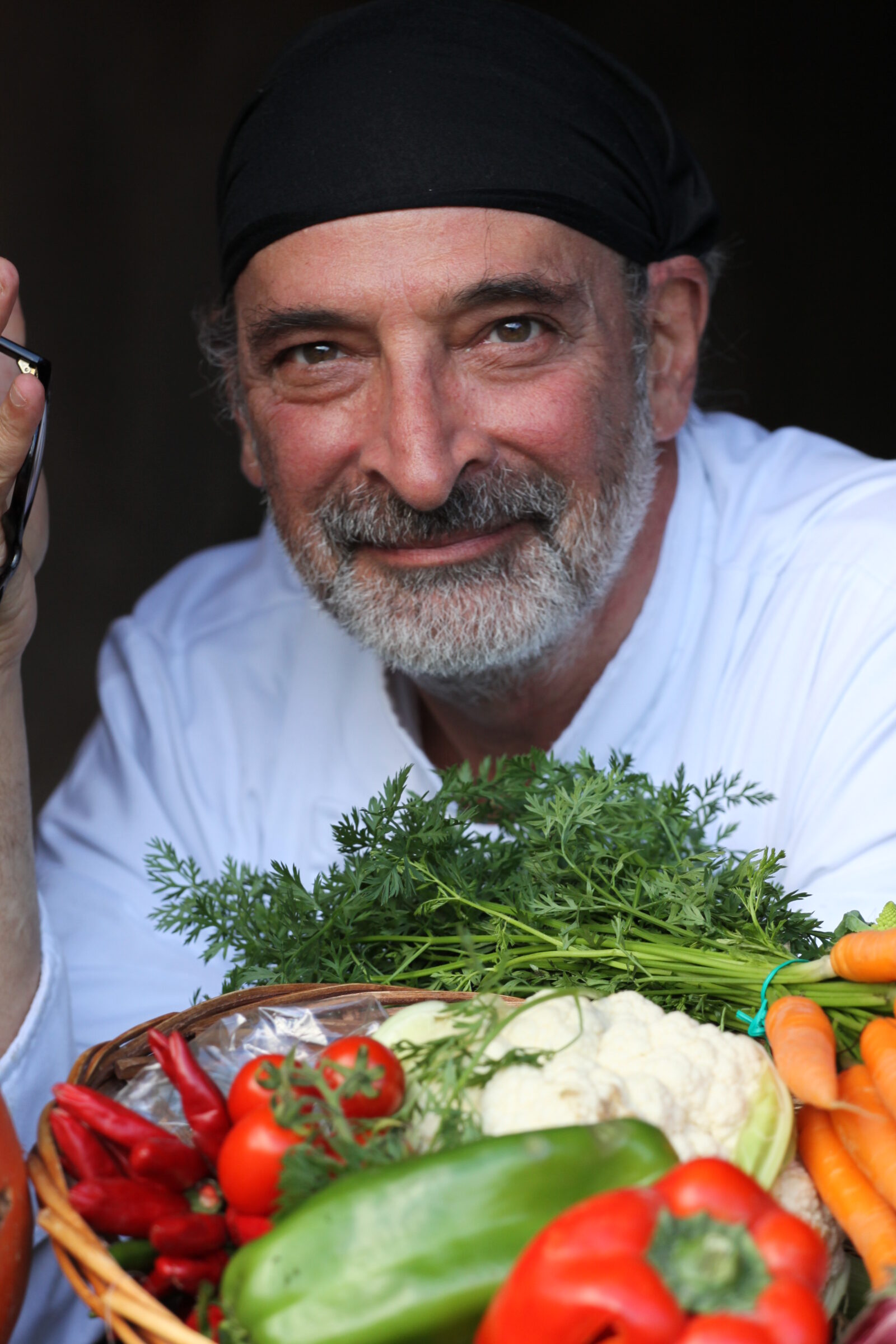
Q: THE BEST THING ABOUT IT – AND I TELL PEOPLE THIS – I’M NOT A GOOD COOK BUT IN ROME I’M A GOOD COOK BECAUSE THE INGREDIENTS ARE SO GOOD. WHAT I LOVE ABOUT IT IS GOING TO PUBLIC MARKETS. YOU GET CHEESE HERE AND YOU TALK TO YOUR GUY. YOU GET YOUR FISH HERE AND YOU TALK TO YOUR GUY. IT’S A WHOLE SOCIAL ACT. YOU DON’T GET THAT ANYWHERE ELSE. WE HAD FARMERS MARKETS ONCE A WEEK IN DENVER AND EVERY TOMATO WAS $2.50.
A: Maybe (you do in) some of the (New York) Jewish delis. That’s the stuff I miss. There’s a project I’ll be doing. Technical American sandwiches but with all Italian flavors. Sandwiches are wonderful.
His childhood
Q: I READ YOU GOT INTO COOKING BECAUSE YOUR MOTHER WAS SO SUCCESSFUL AND WAS WORKING SO MUCH SHE DIDN’T HAVE TIME TO COOK
A; That’s when I was living in the States. Between reform school and the nuns when I stayed with my mother, she’d come home at night and say, “What’s for dinner?” I was 9, 11. But when I came to Italy that was a mind-blowing thing. I met my dad when I came here when I was 14 ½. I didn’t know him before. I knew of him. The choice was reform school until I was 21 or, “I think it’s time you met your father.”
Q; WHY WERE YOU GOING TO REFORM SCHOOL?
A; I went twice. I was boisterous.
Q; WHAT WAS THE WORST THING YOU DID?
A; I set telephone booths on fire. To get the money. We had these matchguns. You put them inside the telephone and it would catch fire. I was very good with fire, breaking windows. I certainly didn’t kill anybody. I came close to it but it wasn’t in the plan to kill somebody.
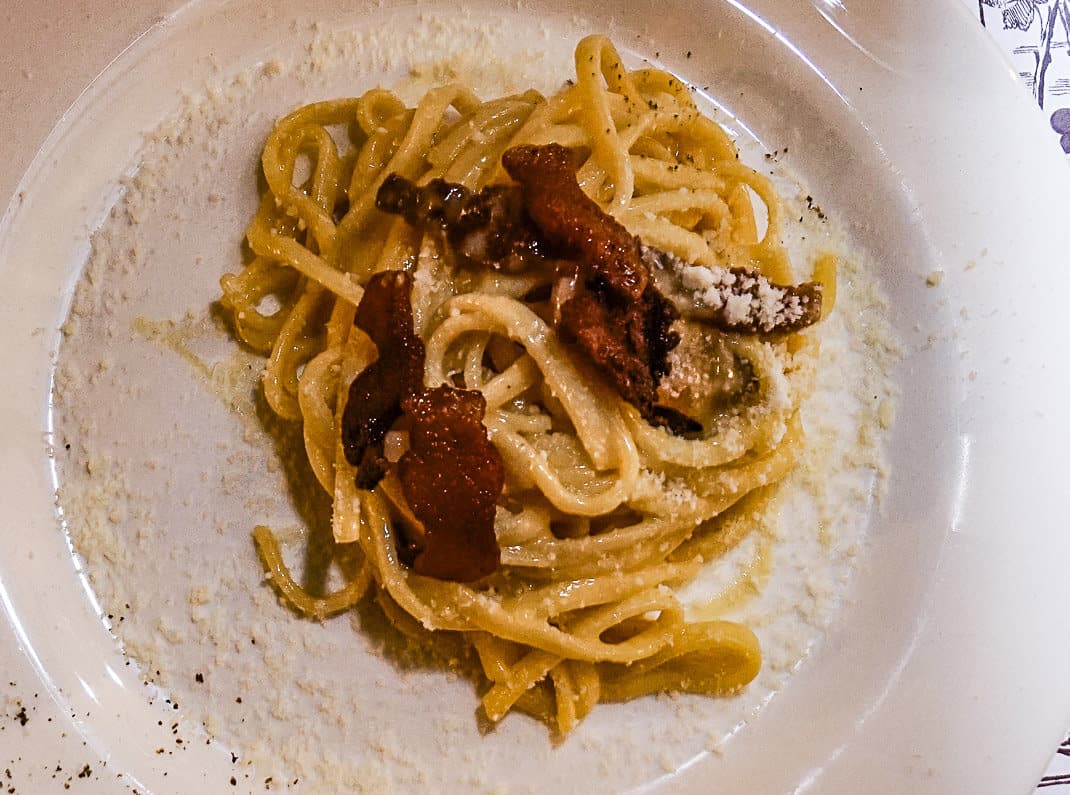
Q: How was Italy when you arrived at 14?
A: It was absolutely horrible. I would’ve preferred to stay with my mom. I came to Rome. Dad was producing his dubbing. At the house we had Fellini, (Luchino) Visconti, (Marcello) Mastroianni, Sophia Loren. I’d never been to the movies. I didn’t know who these people were. Dad had me eat in the kitchen with the servants. That was the best thing for me. Maria, the lady I dedicated my first book to, taught me how to do a scarpetta. (Using bread to scoop up leftover sauce.) It just blew my mind completely. It was absolutely wonderful. That’s what turned me on.
The first year in Italy was difficult. I didn’t like anybody. I didn’t speak the language. My dad was truly revered by anybody in the business. He was super cool.
Q: YOU SAID YOUR FATHER HAD YOU EAT IN THE KITCHEN WITH THE SERVANTS. HOW’D THAT TRANSFORM YOU?
A; It was the same (food) but it wasn’t served as nice. That was already an education, seeing how things were prepared. I’d see the produce coming in the morning. That’s when I wasn’t going to school on weekends. Then I’d see it being made. My favorite dish was spaghetti with tomato sauce. And the scarpetta.
Q; I READ SPAGHETTI WITH TOMATO SAUCE IS STILL YOUR FAVORITE DISH
A; That’s it. That’s the best dish in the world. Olive oil. Garlic. The most difficult dishes to make are the ones with the fewest ingredients. When you have only three or four ingredients you have to be very careful.
Q; WHY?
A; Because that’s what comes out. When you have 10-15 things, it’s “Is this OK?” No. Put a little more of this.
Q; I SEE A BIG INFLUENCER WAS THIS GUY NAMED CASOLI WHO TOOK YOU OUT IN THE FIELDS AND THE BOAT AND THE DAIRY
A; Angelo Casoli. When I first got into the cooking, I said, “This is going to be good for me.” I looked at all these Michelin-star guides and was trying to do things and I got totally confused. I called him up and he said, “OK, you have to stay three months at my house.” I can’t stay three months but I can stay a month. And he took me out to the fields. He took me out on fishing boats. He took me out to cheesemakers. In Puglia. And I found what I like doing. He was a big influence. He changed the course of my thinking.
Q; WHAT’S YOUR FAVORITE INGREDIENT?
A; Extra virgin olive oil.
Q; SETTLE A BIG DEBATE. WHAT REGION HAS THE BEST OLIVE OIL IN ITALY?
A; OK, there’s no such thing as Sicilian olive oil or Pugliese olive oil. Because there are so many different types. I’ve been using an oil from Calabria, one from Rimini. Then they sent me some oil from Sicily and Puglia. In my home I always have three different kinds of oil. And it depends on what I’m cooking. I use as little as possible in cooking. Then I use it when dishes go out. That’s the flavor. That’s my main ingredient.
Q; WHAT WAS THE WORST EXPERIENCE? COOKING ON A SHIP OR COOKING ON TELEVISION?
A; Probably cooking on television.
Q; I READ YOUR DESCRIPTIONS: “DISASTER.” “SHIT.” WHY WAS IT SO BAD? I SEE THESE SHOWS ALL THE TIME.
A; Because they give you 15 minutes and say, “Make this.” You can’t make a good risotto in 15 minutes. You have to be cute and smart and nice looking. And make things with no assistance.
Q: RESEARCHING YOU, I SEE COOKING IS JUST ONE OF YOUR PASSIONS
A: It’s my principle. It’s what I always wanted to do. I came out of Boston University with two degrees. One was in communications and was in sociology.
Q: YOU SHOULD’VE BEEN A SPORTSWRITER LIKE ME.
A: When I finished they called me to go to Vietnam. I said I’m not doing that. I was a young hippie at the time.
Q: YOU’RE AN OLD HIPPIE NOW. I LIKE YOUR HAIR.
A: It’s just laziness. So I went to culinary school in Southern Italy. I deserted.
As an actor
Q: WHY SOUTHERN ITALY? I KNOW YOU’RE ITALIAN.
A: It was just a series of coincidences. And I love Puglia. I don’t know how I ended up there. It was a region of Italy that was very good to me later on in years. Right around that time – it was 1978, something like that – I got involved with television. It’s not like I wanted to do television. I was predisposed. I started working in television and the last thing I expected was I became popular. It wasn’t in my plans. But it was OK. It was easy.
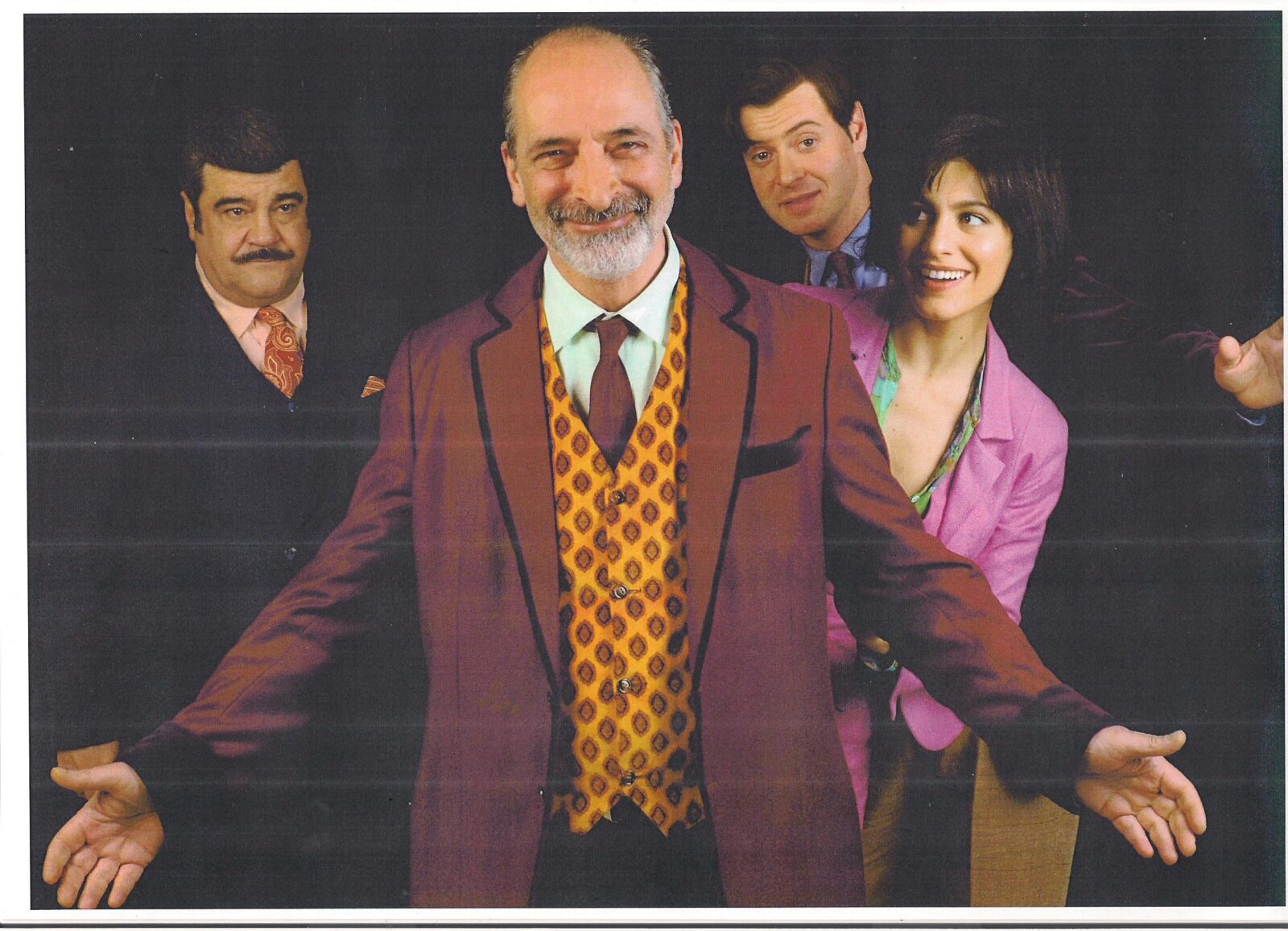
Q: REMEMBER THE FIRST SHOW YOU DID?
A: The first show I did was “L’Altra Domenica” (in 1979) that was hosted by a guy named Lorenzo Arbore. The executive producer was Rai and the artistic producer was a guy called Ugo Porcelli who’s still Lorenzo’s producer.
Q: WHAT WAS IT ABOUT?
A: It was a comedy news show. It was before “Striscia la Notizia” which is still big. It was a crazy-looking studio which cost nothing. Lorenzo had some of his crazy friends, young kids. Isabella Rosellini was in it. She was a correspondent from New York. It was just a lot of crazy people, interviewing people on the street. And he had a studio situation for my character which he invented 10 days before it aired. I was (playing) his cousin’s son who had nothing to do. “I’m sending him to Italy. Give him a job.” So I was just hanging around the studio. I didn’t speak Italian – that was the idea. I spoke Italian (in real life). I looked into the camera and did funny things. It was stupid. It was silly …. But the intellectuals liked it somehow. We won all sorts of awards. People wrote their university theses on my character because I said two words. I divided my character’s world into two halves: good and no good. Buona and no buona. And that was it. That was ‘79-80. Then in ‘85, that program sort of taught me that television could be something else because we had no scripts. Before the other program (in 1985), which was “Quelli della Notte,” Lorenzo Alberi, who worked on that program as well, called a bunch of us and said they’re going to give us a free cruise from Genoa to Casablanca … When we landed in Casablanca, we went to a nightclub where they did some Moroccan standup. There was a lot of pot running around, hashish. So Lorenzo said, “Go up and do something.” So we all went up there and acted like fools. We were all very high. We were coming back to the boat, he said, ‘That’s our next program.’ And that’s what the program was.
Q: YOU MUST’VE HAD SOMETHING GOING ON WITH THE COPS BECAUSE I WAS IN MOROCCO IN THE ‘70S AND IF YOU GOT CAUGHT WITH POT AS A WESTERNER, YOU WENT TO JAIL FOR A LONG TIME
A: In the ‘90s I was doing some documentaries there for World Wildlife Fund. We ended up somewhere in the mountains between Marrakech and Telouet, where they produce hashish. They took us to what was like cheese tasting. “Try some of this; try some of that.” And they gave us a big gift. (The guide) said, “As soon as you turn the corner, throw it away because the police are going to be there waiting for you.” So we did. We threw it away. Sure enough, the police searched us. “We know you have it.” So we were very, very lucky.
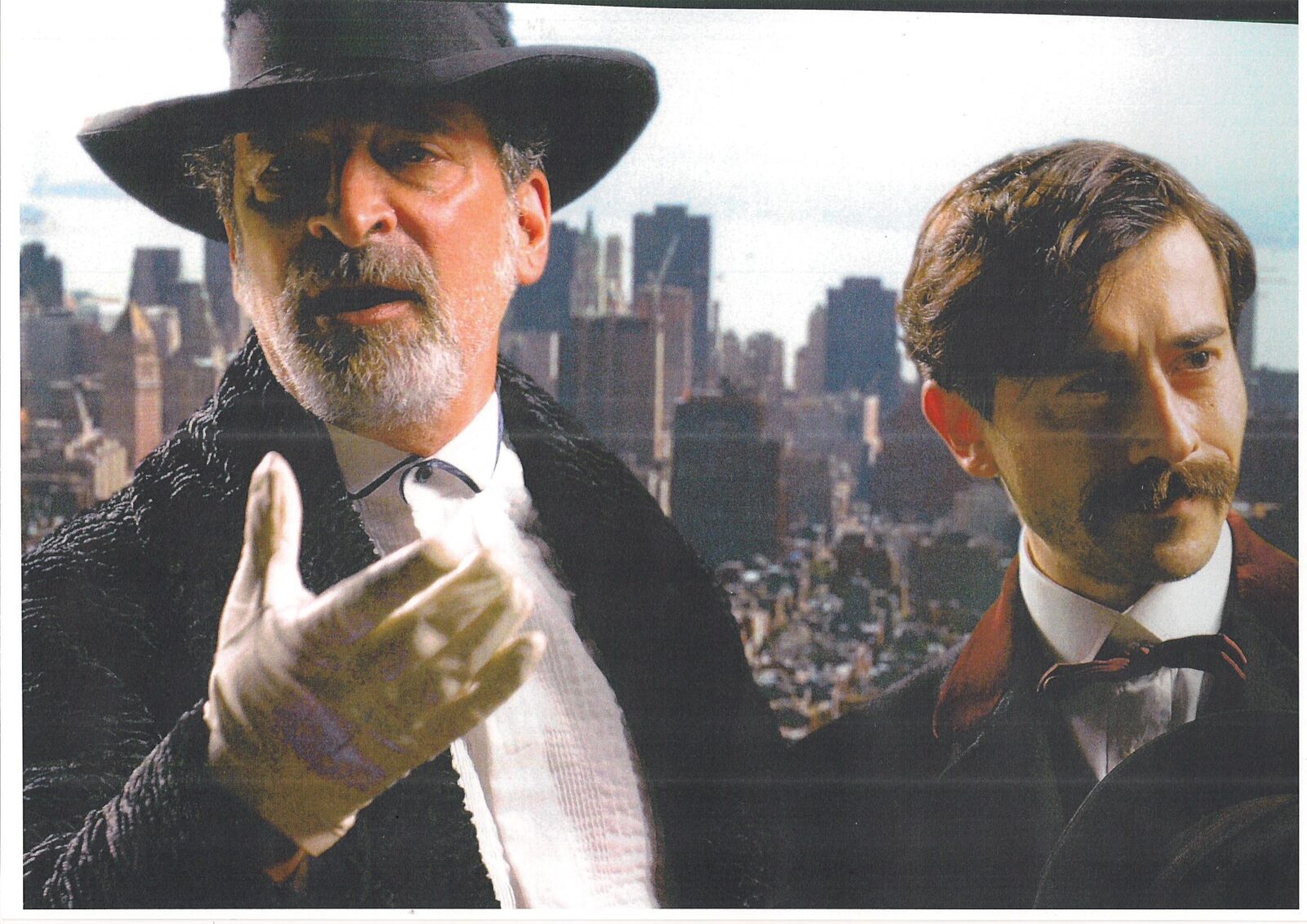
Q: ARE YOU A CHEF WHO’S ALSO AN ACTOR OR AN ACTOR WHO’S ALSO A CHEF?
A: My heart is in the cooking. When they called me to do films, it was like free money. I never took it seriously. The first film they gave me was called “Super Andy,” Superman’s ugly brother. I said, “No, I can’t do this.” Then I said, “How much? They’re going to give me that much money? Let’s do four or five of them.” It was a terrible film. I did OK in Japan. Really cheap movie done in three or four weeks. They offered me more films like that. I was already working in restaurants and I said, “OK, let’s do it. I don’t care.”
Q: WAS ACTING NATURAL FOR YOU?
A: I had a good memory. Then I started to do theater with very important directors. Gigi Proietti, Gabriele Lavia. Good roles. I wasn’t interested in major roles. Somehow it worked. Then we did a film that was an HBO production. I was co-starring with Chazz Palminteri. He did (Giovanni) Falcone and I did (Paolo) Boriellino, the two famous Italian judges who were both killed. “Excellent Cadavers” (1999) I think it was called. I got great reviews on that. That brought me to “Romeo and Juliet” where I played Friar Lawrence.
Q: I SAW ONE BAD REVIEW YOU GOT FROM THE MUSLIMS WHEN YOU PLAYED HARMAND
A: That was in “Quelli della Notte.” I had a death threat. I traveled with the police for six months because they wanted to kill me. It was just fun. I called my Arab friends and said, “Teach me some words.” I was doing rap songs in fake Arabic. Since their language is sacred, everything I said was sacrilege. I was beat up twice, outside the television studios. I wanted to quit and the producer said, “No. Keep doing it. This is really good.” Then a magazine called Oggi said, ‘We’ve got an idea. Why don’t we do a tour of Arab countries where you ask forgiveness?”
“For what? OK, let’s do it.”
They had me do the same thing in their theaters with their comics except it was all burps and farts. That was their comedians. I never did stuff like that. When we got to Libya. There was a picture of me and Ghaddafi embracing. That was it. The death threat was taken away. It was a TV series. I was doing it night after night.
Q: LAST QUESTION: PRETEND YOU’RE GOING TO BE EXECUTED TOMORROW MORNING. WHAT’S THE MEAL YOU EAT TONIGHT.
A: Oh, spaghetti with tomato sauce. I’d like to be executed in the beginning of September. Because that’s when the tomatoes are at the top.
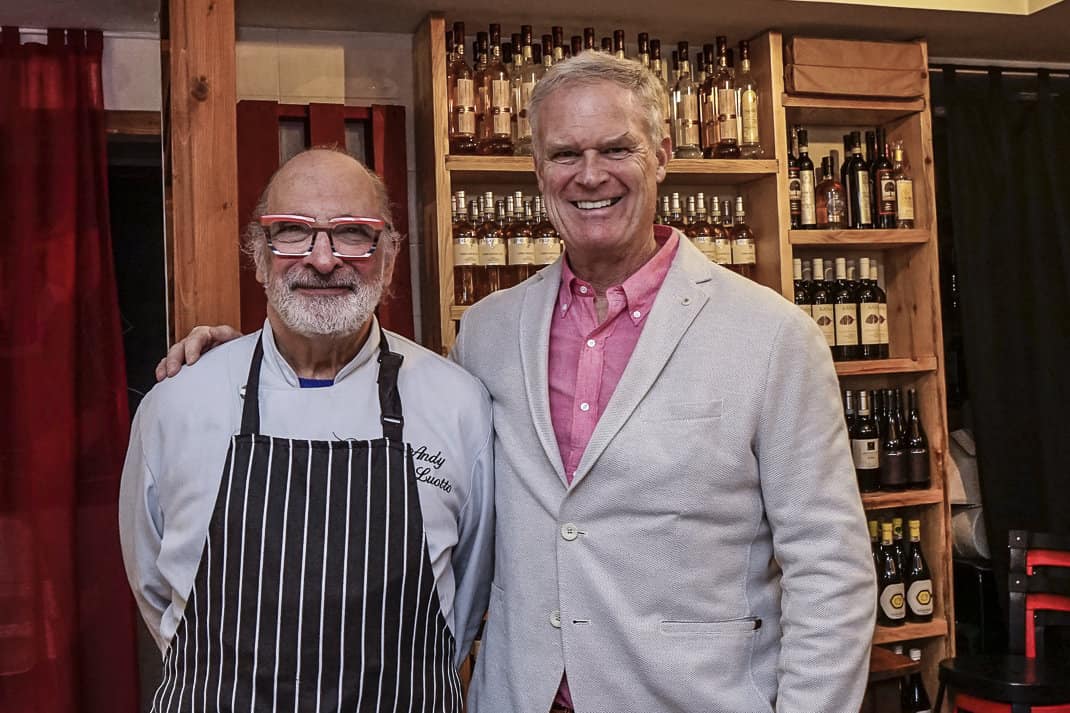
Andy Luotto’s 10 Commandments
- Eat products grown and raised as close as possible to home.
- Cultivate the palate and the sense of smell from an early age.
- Remember the dishes that you ate, the good and the bad.
- Honor those who cooked well for you.
- Don’t waste leftover food.
- Be clean when you cook and when you eat.
- Be generous with the portions.
- Satisfy your hunger with good and true things.
- Crave dishes better than yours.
- Be what you eat.


March 7, 2023 @ 1:49 pm
What a great interview with a fascinating person!! Thank you!
March 7, 2023 @ 9:45 pm
He sounds like George Santos as surely nobody can do all the things he says he has done! What an interesting guy! Thanks for the article.
March 8, 2023 @ 3:16 pm
Excellent! You are Eugene’s son for sure! I grew up with your dad we are first cousins and you are my second cousin. Your mom, Beatrice brought you to my house for a visit when you were about Four. I have not see you or Stevie since. Your career is wonderful. I see you on Facebook here in the States. You certainly have had a diversified life. Best of luck in your future endeavors.
March 14, 2023 @ 9:13 am
Great article. I’m in love with the Chef. What a life! Wish I could have been there.